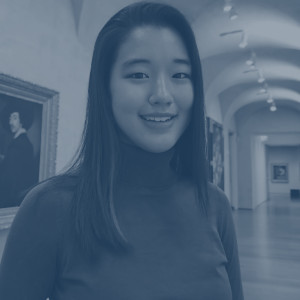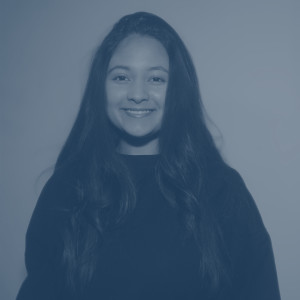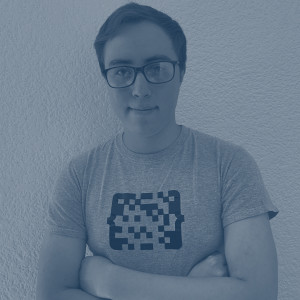Gabriel de Melo Cruz, 23
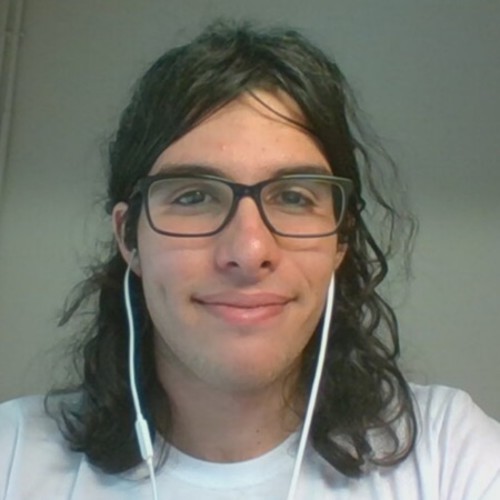
A large part of Gabriel’s introduction to coding was due to his bond with his older brother. They would watch each other play video games while passing the controller back and forth and quickly back again to his brother, who did the majority of the playing. Gabriel loved watching, and when his brother wanted to play a game that involved building a whole setup, he learned the basics of building computers and running servers. He never thought that he had it in him, but his admiration of his brother drove him to use what he learned by simply being there. His brother eventually became a software engineer, which Gabriel continued to learn from. Their shared growth alongside each other has been a huge part of where Gabriel is today.
It took a while for Gabriel to get going with a group that he cared about, but he finally landed on Ganesh in 2018. Ganesh was a security group, Gabriel’s first introduction to cybersecurity. Using the years of knowledge he had from growing up with his brother, he took on a leadership position fairly quickly. Admittedly, he didn’t know a lot about cybersecurity, but he did know a lot about computers. He saw a leadership opportunity and took it, teaching the basics of computer dashboards to the first-year students of the group, while studying cybersecurity on the side to ensure that he was doing the most that he possibly could. He would study every day, teach once or twice a week, and before he knew it, he was more than fit for the position. He became a large part of the club, so when Computer Science Week came along, it was natural that he would be asked to speak. Gabriel couldn’t refuse, and even went a step further, volunteering to run a workshop on Denial of Service. His emphatic drive to bring information to others was rewarded by a great turnout. The hours of supplementary studying that Gabriel did in order to better himself and help others left him with the means to work with a lawyer in order to implement data privacy laws for several companies.
In 2020, Gabriel was given the opportunity to start an exchange program in France. The program was impacted by COVID-19, and he was left with nothing to do but play music. After waiting around in quarantine, a friend messaged him with an opportunity for those familiar with Open Source called the MLH Fellowship. More than familiar, Gabriel applied, with little hopes of acceptance. He had tried multiple programs before, and none of them worked out, but an application and three interviews later, MLH saw Gabriel’s potential and accepted him.
The Fellowship was an amazing time. Gabriel knew going into it, based on his friend’s advice, that he needed to really focus on it since he was so excited about it. This was no problem for Gabriel, who had proven to himself that he will go above and beyond to educate himself about his passions. Beyond educating himself, he knew now that he loved educating others, and decided to become a Pod Leader with MLH. He thought he had it in him, and with some encouraging words from fellow leaders, he took on the responsibility. His relationship with his mentors encouraged him to bring the utmost sense of understanding to his future leadership positions. The shift to programming studies in college was relatively simple for Gabriel given the years of coding knowledge he had built up. It was seemingly unorthodox to start programming so much later after building such a large framework of coding knowledge, but that inevitably paid off. He was very quickly comfortable in front of a code editor. Among the constant coding grind, Gabriel built a project that he still uses everyday called xcreep, an easy to use, easier to install script that has made life just a little easier for a busy student.
Because it’s been so long since Gabriel entered the community as an active member, it’s hard for him to say how his time with his peers has changed his life because there are so many points in his life that were directly impacted by his peers. An easier pool of experiences to draw from would be the ways that his life hasn’t been changed by his community since it’s so much smaller of a pool. He’s made lifelong friends, met people from around the world, and seen other countries all thanks to his time in tech. He can compare his day-to-day work to a hackathon: hard deadlines, prioritization, and concentration without comparison. Everyone ends up finding their niche in a hackathon, just like they do in life. Gabriel has found his niche after countless failures. Luckily, he didn’t see his failures as a sign to quit, but as a sign to do the most to make sure it doesn’t happen again.
Quick Facts
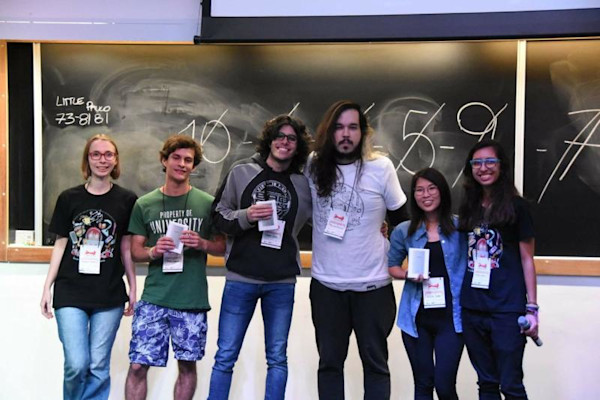
Gabriel de Melo Cruz, 23

A large part of Gabriel’s introduction to coding was due to his bond with his older brother. They would watch each other play video games while passing the controller back and forth and quickly back again to his brother, who did the majority of the playing. Gabriel loved watching, and when his brother wanted to play a game that involved building a whole setup, he learned the basics of building computers and running servers. He never thought that he had it in him, but his admiration of his brother drove him to use what he learned by simply being there. His brother eventually became a software engineer, which Gabriel continued to learn from. Their shared growth alongside each other has been a huge part of where Gabriel is today.
It took a while for Gabriel to get going with a group that he cared about, but he finally landed on Ganesh in 2018. Ganesh was a security group, Gabriel’s first introduction to cybersecurity. Using the years of knowledge he had from growing up with his brother, he took on a leadership position fairly quickly. Admittedly, he didn’t know a lot about cybersecurity, but he did know a lot about computers. He saw a leadership opportunity and took it, teaching the basics of computer dashboards to the first-year students of the group, while studying cybersecurity on the side to ensure that he was doing the most that he possibly could. He would study every day, teach once or twice a week, and before he knew it, he was more than fit for the position. He became a large part of the club, so when Computer Science Week came along, it was natural that he would be asked to speak. Gabriel couldn’t refuse, and even went a step further, volunteering to run a workshop on Denial of Service. His emphatic drive to bring information to others was rewarded by a great turnout. The hours of supplementary studying that Gabriel did in order to better himself and help others left him with the means to work with a lawyer in order to implement data privacy laws for several companies.
In 2020, Gabriel was given the opportunity to start an exchange program in France. The program was impacted by COVID-19, and he was left with nothing to do but play music. After waiting around in quarantine, a friend messaged him with an opportunity for those familiar with Open Source called the MLH Fellowship. More than familiar, Gabriel applied, with little hopes of acceptance. He had tried multiple programs before, and none of them worked out, but an application and three interviews later, MLH saw Gabriel’s potential and accepted him.
The Fellowship was an amazing time. Gabriel knew going into it, based on his friend’s advice, that he needed to really focus on it since he was so excited about it. This was no problem for Gabriel, who had proven to himself that he will go above and beyond to educate himself about his passions. Beyond educating himself, he knew now that he loved educating others, and decided to become a Pod Leader with MLH. He thought he had it in him, and with some encouraging words from fellow leaders, he took on the responsibility. His relationship with his mentors encouraged him to bring the utmost sense of understanding to his future leadership positions. The shift to programming studies in college was relatively simple for Gabriel given the years of coding knowledge he had built up. It was seemingly unorthodox to start programming so much later after building such a large framework of coding knowledge, but that inevitably paid off. He was very quickly comfortable in front of a code editor. Among the constant coding grind, Gabriel built a project that he still uses everyday called xcreep, an easy to use, easier to install script that has made life just a little easier for a busy student.
Because it’s been so long since Gabriel entered the community as an active member, it’s hard for him to say how his time with his peers has changed his life because there are so many points in his life that were directly impacted by his peers. An easier pool of experiences to draw from would be the ways that his life hasn’t been changed by his community since it’s so much smaller of a pool. He’s made lifelong friends, met people from around the world, and seen other countries all thanks to his time in tech. He can compare his day-to-day work to a hackathon: hard deadlines, prioritization, and concentration without comparison. Everyone ends up finding their niche in a hackathon, just like they do in life. Gabriel has found his niche after countless failures. Luckily, he didn’t see his failures as a sign to quit, but as a sign to do the most to make sure it doesn’t happen again.
Quick Facts

